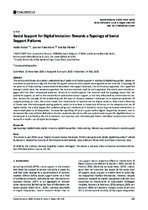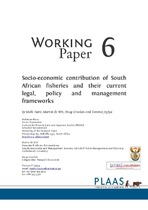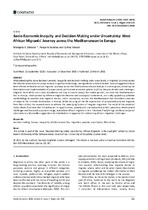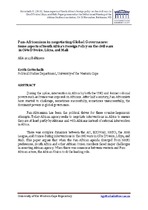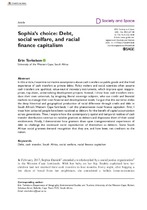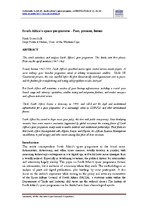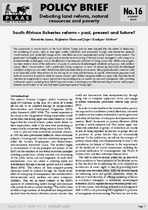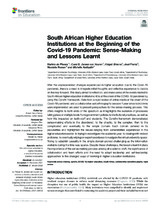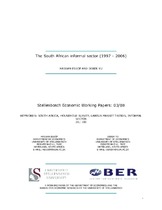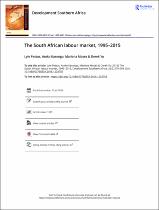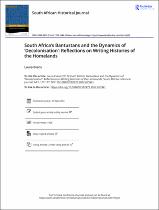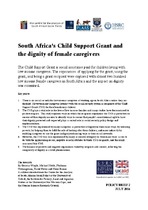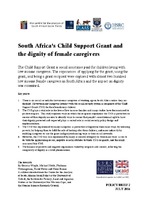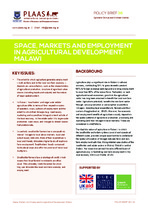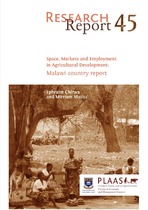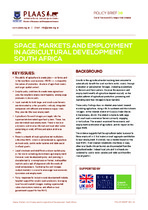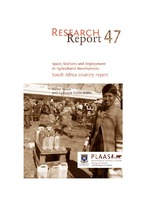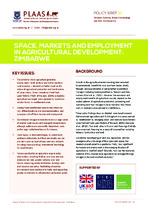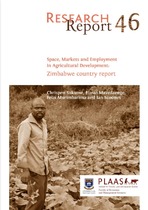Browsing Faculty of Economic and Management Sciences by Title
Now showing items 904-923 of 1101
-
Social support for digital inclusion: Towards a typology of social support patterns
(Cogitatio Press, 2020)This article contributes to a better understanding of patterns of social support in relation to digital inequalities. Based on an extensive qualitative study, the diversity of support networks and supports seeking patterns ... -
Socio-economic contribution of South African fisheries and their current legal, policy and management frameworks
(Institute for Poverty, Land and Agrarian Studies, University of the Western Cape, 2008)The Marine Living Resources Act (No. 18, 1998) establishes as an objective the utilisation of marine living resources to achieve, inter alia 'economic growth, human resource development, capacity building within fisheries ... -
Socio-economic inequity and decision-making under uncertainty: West African migrants’ journey across the Mediterranean to Europe
(Cogitatio Press, 2021)Understanding the nexus between poverty, inequality and decision-making under uncertainty in migrants’ journeys across the Mediterranean Sea to Europe remains a significant challenge, raising intense scholarly debate. ... -
Some aspects of South Africa’s foreign policy on the civil wars in Côte D’Ivoire, Libya, and Mali
(2013)During the 1960s, intervention in Africa by both the UNO and former colonial powers such as France was imposed on Africans. After half a century, Pan-Africanists have started to challenge, sometimes successfully, sometimes ... -
Sophia’s choice: Debt, social welfare, and racial finance capitalism
(SAGE, 2021)In this article, I examine normative assumptions about cash transfers as public goods and the lived experience of cash transfers as private debts. Policy makers and social scientists often assume cash transfers are ... -
South Africa's space programme - Past, present, future
(Routledge, 2010)This article introduces and analyses South Africa’s space programme. This divides into three phases. First was the age of amateurs 1947-1962. Second, between 1963-1993, South Africa’s apartheid ancien regime started ... -
South Africa: Urban transformation
(Elsevier, 2000)This paper discusses transformation as a multi-dimensional concept to effect social change in South African society in the post-apartheid era. The policy implications of such a variegated understanding of social change ... -
South African fisheries reform – past, present and future?
(Institute for Poverty, Land and Agrarian Studies, University of the Western Cape, 2004)Two approaches to transformation of the South African fishery industry were adopted after the advent of democracy: the broadening of access rights to new rights holders (individuals and companies) through state intervention ... -
South African higher education institutions at the beginning of the Covid-19 pandemic: Sense-making and lessons learnt
(Frontiers, 2022)After the unprecedented changes experienced in higher education due to the Covid-19 pandemic, there is a need to integrate initial thoughts and reflective experience to decide on the way forward. This study aimed to reflect ... -
The South African informal sector (1997 – 2006)
(Stellenbosch University, 2008)According to the 2006 September Labour Force Survey, approximately 22% of the employed (excluding domestic workers and agricultural employment) are engaged in informal sector activities as their main work to sustain ... -
The South African labour market, 1995–2015
(Taylor and Francis Group, 2016)This study investigates the changes in the South African labourmarket in the post-apartheid period. While unemploymentincreased over the 1995–2015 period, employment also increased.Nonetheless, the extent of employment ... -
South Africa’s Bantustans and the dynamics of “decolonisation”: Reflections on writing histories of the homelands
(Taylor and Francis Group, 2012)From the late 1950s, as independent African polities replaced formal colonialrule in Africa, South Africa’s white minority regime set about its own policy ofmimicry in the promotion of self-governing homelands, which ... -
South Africa’s Child Support Grant and the dignity of female caregivers
(Institute for Poverty, Land and Agrarian Studies, University of the Western Cape, 2014)The Child Support Grant (CSG) is social assistance for children with low income caregivers. It is currently paid at the rate of R310 per month and there are more than 11 million child beneficiaries. Almost all (98%) of ... -
South Africa’s Child Support Grant and the dignity of female caregivers
(Institute for Poverty Land and Agrarian Studies (PLAAS), 2014)The Child Support Grant is social assistance paid for children living with low income caregivers. The experiences of applying for the grant, using the grant, and being a grant recipient were explored with almost two hundred ... -
Space, markets and employment in agricultural development: Malawi
(Institute for Poverty, Land and Agrarian Studies, University of the Western Cape, 2015)Agriculture plays a significant role in Malawi’s national economy, contributing 35% to gross domestic product, 90% to foreign exchange earnings and providing employment to more than 80% of the labour force. Particularly ... -
Space, markets and employment in agricultural development: Malawi country report
(Institute for Poverty, Land and Agrarian Studies, University of the Western Cape, 2015)There is a growing literature on the links between farm and non-farm employment activities in rural societies and the important roles played by rural non-farm employment in poverty reduction (Lanjouw, 2001; Davis et al., ... -
Space, markets and employment in agricultural development: South Africa
(Institute for Poverty, Land and Agrarian Studies, University of the Western Cape, 2015)Growth in the agricultural sector has long been assumed to automatically benefit the rural non-farm sector, mainly through production or consumption ‘linkages’, including expenditure by farmers and their workers. However ... -
Space, markets and employment in agricultural development: South Africa country report
(Institute for Poverty, Land and Agrarian Studies, University of the Western Cape, 2015)Throughout much of the developing world, including sub-Saharan Africa, agriculture is frequently viewed as central to efforts to foster development and reduce poverty. Key conceptual and policy issues accordingly raised ... -
Space, markets and employment in agricultural development: Zimbabwe
(Institute for Poverty, Land and Agrarian Studies, University of the Western Cape, 2015)Growth in the agricultural sector has long been assumed to automatically benefit the rural non-farm sector, chiefly through various production or consumption expenditure ‘linkages’ including local expenditure by farmers ... -
Space, markets and employment in agricultural development: Zimbabwe country report
(Institute for Poverty, Land and Agrarian Studies, University of the Western Cape, 2015)Since independence in 1980, Zimbabwe has undergone several phases of land redistribution, generally to communal and working people. The latest phase was the Fast-Track Land Reform Programme (FTLRP), which began in 2000 ...

